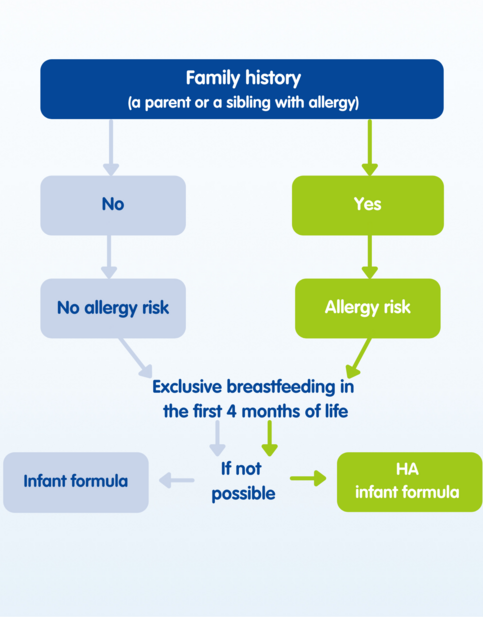Ինչպե՞ս ճանաչել իմ երեխայի ալերգիան:
Ալերգիան՝ իմունային համակարգի հիպեր ռեակցիա, իրականում ինքնին վտանգ չի ներկայացնում առողջության համար: Այնուամենայնիվ. Ալերգիկ ախտանշաններին պետք է լուրջ վերաբերվել և բացարձակապես պետք է ստուգվեն ձեր մանկաբույժի կողմից: Արձագանքները կարող են տարբեր լինել՝ աչքերի քորից մինչև շնչառության պակաս:

Որքան բարձր է
ալերգիայի վտանգ Ձեր երեխայի համար:
Վտանգը մեծանում է, եթե մայրը, հայրը կամ քույրն ու եղբայրը ունեն գերզգայունություն, ինչպիսիք են խոտի տենդը, էկզեմա, սննդային ալերգիա կամ ալերգիկ ասթմա: Ալերգիաները հաճախ ժառանգական են: Նույնիսկ եթե ընտանիքում հայտնի ալերգիա չկա, ձեր փոքրիկ արևի համար ալերգիայի վտանգը երբեք չի կարելի 100% բացառել:
Ալերգիայի ռիսկի ստուգում ձեր երեխայի համար.
- Ցածր ռիսկ. Եթե անմիջական ընտանիքում (օրինակ՝ մայրը, հայրը, քույրերն ու եղբայրները) հայտնի ալերգիաներ չկան, հետևում է, որ ձեր փոքրիկ արևի լույսը ալերգիայի ցածր ռիսկ ունի: Այնուամենայնիվ, քանի որ ալերգիայի վտանգը երբեք չի կարելի 100%-ով բացառել, դուք պետք է շատ ուշադրություն դարձնեք ձեր երեխային նոր մթերքներ տալիս, օրինակ. երբ դրանք սկսում են պինդ մարմինների վրա:
- Չափավոր ռիսկ. Եթե ընտանիքի անմիջական շրջապատում առկա են ալերգիայի միայն առանձին դեպքեր (օրինակ՝ մայրը, հայրը կամ քույրը կամ քույրը ունեն), ձեր երեխայի մոտ ալերգիայի չափավոր ռիսկ կա: Ալերգիա, ձեր երեխան ունի ալերգիայի բարձր ռիսկ:
- Շատ բարձր ռիսկ. Եթե անմիջական ընտանիքում կան երկու կամ ավելի մարդիկ, ովքեր տառապում են նույն կամ ավելի ալերգիաներից, ձեր երեխայի մոտ ալերգիայի շատ բարձր ռիսկ կա:
Ալերգիայի ռիսկը հնարավորինս նվազեցնելու համար, եթե կա ալերգիայի չափավոր կամ շատ բարձր ռիսկ, խորհուրդ ենք տալիս ձեր երեխայի համար կանխարգելիչ գործողություններ ձեռնարկել, այսինքն՝ ցածր ալերգեններով դիետայի տեսքով: Գիտական հետազոտությունները ցույց են տվել, որ ձեր երեխային ցածր ալերգենիկ արտադրանքով հետևողականորեն ապահովելը կարող է նվազեցնել ալերգիայի ռիսկը մինչև 50%: Բացի այդ, կրծքի կաթը լավագույնն է երեխաների համար, նույնիսկ եթե նրանք ունեն ալերգիայի բարձր ռիսկ: Եթե դուք չեք կարող կրծքով կերակրել, կան հատուկ HA (հիպոալերգենիկ) խառնուրդներ ձեր փոքրիկ արևի լույսի համար: Եթե ալերգիայի կամ ալերգիայի վտանգի վերաբերյալ լրացուցիչ հարցեր ունեք, դիմեք ձեր մանկաբույժին:
Questions and answers all about allergy prevention
-
Can I prevent allergies during pregnancy and childbirth?
A low-allergen diet is not recommended during pregnancy.It has not been scientifically established that having a low-allergen diet during pregnancy helps avoid the development of allergies in infants. These days, it is not recommended to follow a low-allergen diet during pregnancy because this increases the risk of inadequate nutrient intake. It has been proven, however, that
- a mother's smoking can increase the child's risk of allergy.
- children who are born naturally are less likely to develop allergies than children who are born via caesarean section.
During a natural birth, bacteria are transferred from the mother that are important for the development of the child's immature immune system.
-
How can allergies be prevented in infants?
For prevention, infants should be breastfed exclusively for at least the first 4 months.Breastfeeding is the best nutrition for every baby, especially if there is already a family history of allergies. If possible, the child should be exclusively breastfed for at least 4 months to prevent allergies. If the milk supply is insufficient or there are other reasons why breastfeeding is not possible, babies with a higher risk of allergies should be fed a hypoallergenic (HA) formula. Please contact your doctor if you have any further questions.
-
How can allergies be prevented at the age of weaning?
Fish and grains containing gluten are recommended even if there is an increased risk of allergy.To train the immune system, solids can be introduced between the ages of 5 to 7 months. As with infants at no risk for allergies, different foods may be introduced gradually for a balanced, age-appropriate, mixed (breastmilk or formula, plus solids) diet. Fish, for example, is highly recommended these days and can enrich the menu within the first year because it provides easily digestible protein and valuable fatty acids. Also, the step by step introduction of grains containing gluten should begin at this time.
-
'Dirt cleanses the stomach!' – is that true?
The body has to come into contact with potential allergens in order to develop defences against themCleanliness and hygiene are especially important in the first six months. During the first few months you should always carefully clean and sterilise bottles, teats and dummies/pacifiers. But please don't forget that your child's physiology has to come into contact with contaminants (e.g. viruses, bacteria, pollens) in order to develop a defence against them. If not, the body may either not react at all (i.e. becomes sick) or reacts excessively (i.e. has an allergic reaction) when it comes into contact with these substances. Let your child explore their environment or play with pets after the first six months. And trust the old adage that 'dirt cleanses the stomach'.
